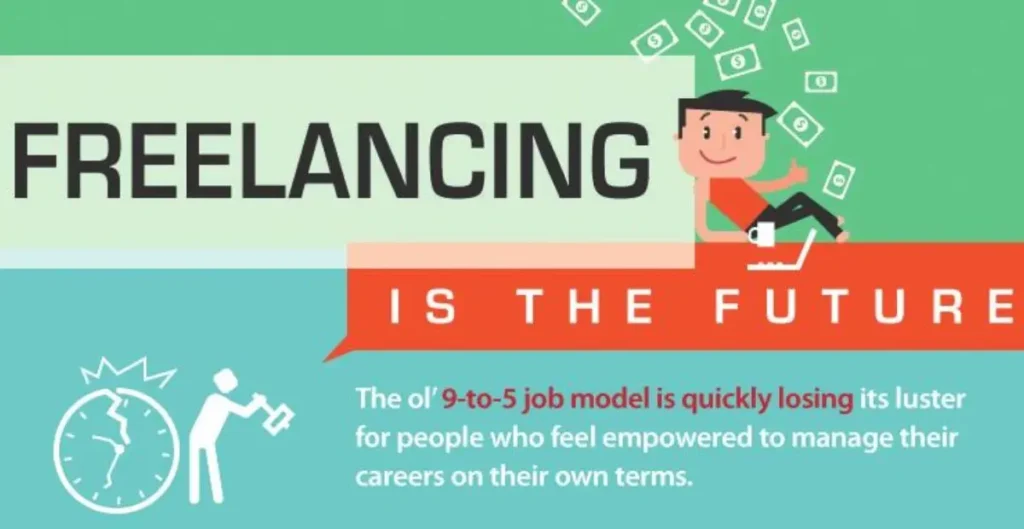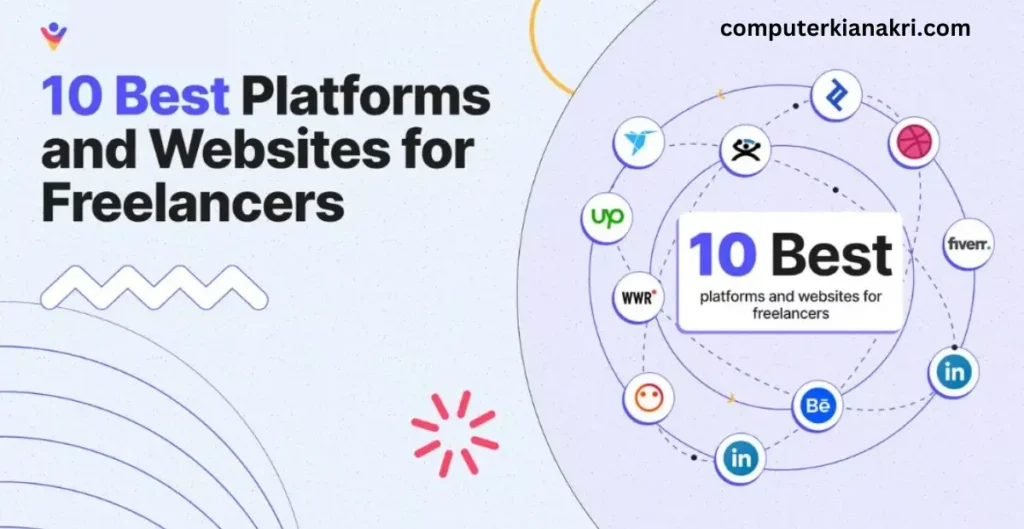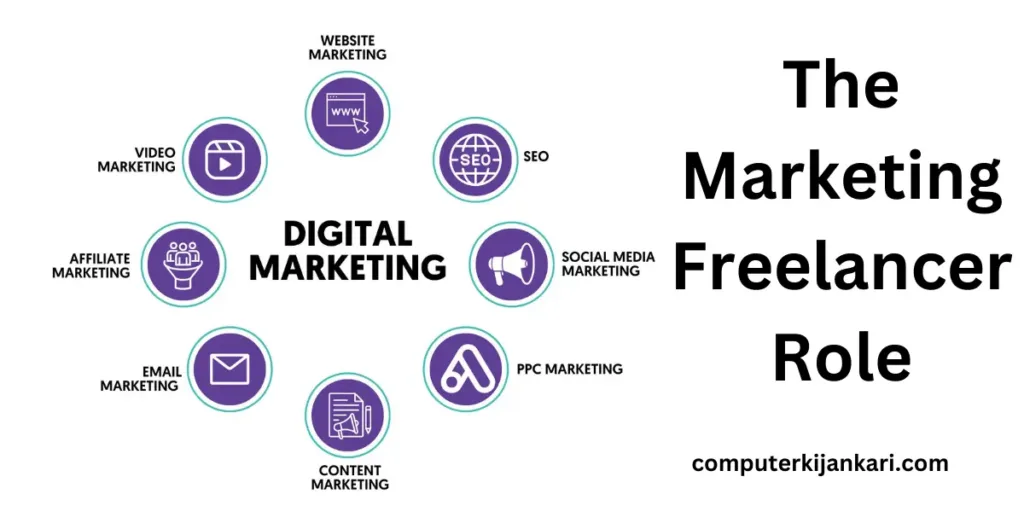How to Become a Freelancer in 2024 💸
Freelancing, also known as independent contracting, is where you work for yourself rather than a traditional employer. You offer your skills and services to clients on a project-by-project basis, choosing your workload and clients according to your preferences. This typically involves

Future of freelancing:
The future of freelancer looks bright, with experts predicting continued growth. Technology will likely play a further role in automating tasks, connecting freelancers with opportunities, and managing projects. However, challenges like job insecurity and lack of benefits require ongoing solutions. Adaptability, continuous learning, and building strong networks will remain crucial for successful freelancers in the evolving landscape.
Assessing Your Skills and Interests
Choosing freelancing as a career path is exciting, but self-awareness is crucial for success. Here’s how to assess your skills and interests to determine if freelancing aligns with your strengths and dreams:
Skills:
- Identify your hard skills: List your technical abilities, certifications, and software proficiency relevant to potential freelance niches (e.g., writing, coding, design, marketing).
- Evaluate your soft skills: Reflect on your communication, problem-solving, time management, and collaborative skills, essential for client interactions and project success.
- Consider niche-specific skills: Research your desired freelance niche and identify its specific skill requirements. Are there areas to further develop or learn new skills?
- Be honest about your weaknesses: Recognizing your limitations allows you to identify complementary skills to cultivate or outsource tasks to partners.
Interests:
- What are you passionate about? What topics, industries, or activities genuinely excite you? Freelancing should align with your intrinsic motivations for long-term satisfaction.
- What problems do you enjoy solving? Consider the challenges you find stimulating and whether your chosen freelance niche allows you to address them.
- What learning approach do you prefer? Freelancing often involves continuous learning. Do you enjoy independent research, online courses, or collaborative learning environments?
- Imagine your ideal work environment: Does the freelance lifestyle (solo work, client interaction, project variety) resonate with your personality and work preferences?
Additional Tips:
- Take online skills assessments: Utilize platforms like Upwork or LinkedIn Skills assessments for a self-evaluation.
- Seek feedback from trusted advisors: Ask mentors, former colleagues, or friends for honest feedback on your strengths and areas for improvement.
- Explore freelance communities: Engage with online forums or local groups to connect with other freelancers and gain insights into specific niches.
- Consider freelancing as a trial: Start with small freelance projects alongside your current job to gain experience and refine your skills before fully committing.
Creating a Freelance Mindset
Building a successful freelance career goes beyond just having the right skills and finding clients. Cultivating a strong freelance mindset is essential for navigating the ups and downs of this independent work style. Here are some key steps to help you develop that mindset:

Shifting Your Perspective:
- From Employee to Entrepreneur: View yourself as the CEO of your own business, responsible for its growth, finances, and success. This proactive approach fosters accountability and strategic thinking.
- Embracing Uncertainty: Accept that income might fluctuate, projects might come and go, and that’s okay. Focus on long-term goals, financial planning, and adaptability.
- Celebrating Autonomy: Cherish the freedom to choose projects, clients, and your work schedule. Enjoy the ownership and control over your career path.
Developing Essential Skills:
- Self-Discipline: Become a master of time management, procrastination resistance, and goal setting. Develop routines and systems to stay productive and meet deadlines.
- Self-Motivation: Stay driven even without a boss cheering you on. Find intrinsic motivation in your work, celebrate achievements, and set inspiring goals.
- Lifelong Learning: Embrace continuous learning as your skills evolve and industry trends change. Invest in courses, workshops, and networking opportunities to stay ahead of the curve.
Building Confidence and Resilience:
- Believe in Your Value: Know your worth and don’t undervalue your skills and experience. Negotiate confidently and charge what you deserve.
- Embrace Rejection: Understand that not every client will be a good fit. View rejection as learning opportunities and move on with confidence.
- Develop a Growth Mindset: Believe you can learn, adapt, and overcome challenges. Don’t be afraid to step outside your comfort zone and embrace failures as stepping stones.
Building a Support Network:
- Connect with fellow freelancers: Join online communities, attend meetups, and find mentors to share experiences, gain advice, and build meaningful connections.
- Invest in professional development: Participate in workshops, webinars, and conferences to learn new skills, network with peers, and stay inspired.
- Seek work-life balance: Schedule time for personal hobbies, social activities, and relaxation to avoid burnout and maintain well-being.
Building a Strong Online Presence
In the digital age, having a strong online presence is crucial for freelancers of all stripes. It’s your virtual storefront, showcasing your skills, experience, and value proposition to potential clients. Here are some key steps to build a strong online presence as a freelancer
1. Claim Your Digital Real Estate:
Professional Website:
This is your home base, a platform to showcase your portfolio, testimonials, services, and contact information. Invest in a user-friendly design with clear navigation and mobile responsiveness.
Social Media Profiles:
Tailor your profiles to your target audience on relevant platforms like LinkedIn, Twitter, or Instagram. Share valuable content, engage with industry discussions, and showcase your expertise.
Online Directories:
List yourself on freelance marketplaces like Upwork, Fiverr, or niche-specific platforms. Optimize your profiles with relevant keywords and highlight your unique selling points.
2. Create High-Quality Content:
Blog or Articles:
Publish insightful articles, tutorials, or industry trends on your website or guest post on relevant platforms. This establishes you as a thought leader and attracts potential clients looking for expertise.
Portfolio Pieces:
Showcase your best work in a visually appealing and organized manner. Use clear descriptions and highlight the results you achieved for clients.
Social Media Engagement:
Share engaging content like case studies, client testimonials, or quick tips related to your services. Foster discussions and connect with potential clients authentically.
Be Consistent and Measure Your Progress:
- Regularly Update Content: Maintain consistency by publishing new content, engaging on social media, and keeping your profiles updated.
- Track Your Results: Analyze website traffic, social media engagement, and inquiries to understand what’s working and where you can improve.
- Adapt and Refine: Continuously update your online presence based on data and feedback, ensuring it reflects your evolving skills and services.
Setting Up Your Freelance Business
Legal and Financial Foundations:
- Business Structure: Decide if you’ll operate as a sole proprietorship, LLC, or another structure based on legal and tax implications. Consult an accountant or lawyer for advice.
- Business Name and Registrations: Register your business name, obtain necessary licenses and permits, and apply for an Employer Identification Number (EIN) if required.
- Taxes: Set up a system for tracking income, expenses, and filing taxes quarterly or annually, depending on your local regulations. Consult a tax professional to ensure compliance.
- Business Bank Account: Separate your personal finances by opening a dedicated bank account for your business transactions.
Establishing Your Brand and Services:
- Define Your Niche: Narrow down your target audience and specialize in specific services you excel at. This helps attract ideal clients and command better rates.
- Develop a Service Plan: Clearly outline your offered services, pricing structure, packages, and delivery timelines. Highlight your unique value proposition and differentiators.
- Create a Portfolio: Showcase your best work through a visually appealing portfolio website or online platform. Include testimonials, case studies, and quantifiable results whenever possible.
- Craft a Compelling Value Proposition: Articulate the benefits you bring to clients and why they should choose you over competitors.
Marketing and Client Acquisition:
- Build Your Online Presence: Develop a professional website, optimize your online profiles, and leverage social media to connect with potential clients. Publish thought leadership content and engage in relevant industry discussions.
- Utilize Freelance Platforms: Consider using platforms like Upwork, Fiverr, or niche-specific marketplaces to find clients and build your initial portfolio.
- Network and Build Relationships: Attend industry events, join online communities, and connect with potential clients and referral partners. Actively network and showcase your expertise.
- Develop Marketing Materials: Create brochures, proposals, and marketing collateral that effectively communicate your value proposition and attract ideal clients.
Marketing and Client Acquisition:
- Build Your Online Presence: Develop a professional website, optimize your online profiles, and leverage social media to connect with potential clients. Publish thought leadership content and engage in relevant industry discussions.
- Utilize Freelance Platforms: Consider using platforms like Upwork, Fiverr, or niche-specific marketplaces to find clients and build your initial portfolio.
- Network and Build Relationships: Attend industry events, join online communities, and connect with potential clients and referral partners. Actively network and showcase your expertise.
- Develop Marketing Materials: Create brochures, proposals, and marketing collateral that effectively communicate your value proposition and attract ideal clients.
Freelancing Platforms

Freelance platforms offer a valuable launchpad for many freelancers, connecting them with potential clients and streamlining project management. However, navigating these platforms effectively is crucial for maximizing their benefits. Here are some key strategies
Choosing the Right Platform:
- Target Audience: Identify your ideal client and research platforms frequented by your target audience. General platforms like Upwork and Fiverr are popular, while niche platforms might offer better visibility.
- Platform Fees: Compare commission structures and subscription models of different platforms to find one that aligns with your budget and earning expectations.
- Reviews and Reputation: Consider platform reputation and client reviews to ensure a trustworthy and professional environment.
Optimizing Your Profile:
- Headline and Summary: Craft a compelling headline and summary that highlight your skills, experience, and unique value proposition. Use relevant keywords to attract potential clients.
- Portfolio and Ratings: Showcase your best work through a visually appealing portfolio. Encourage satisfied clients to leave positive ratings and reviews to build trust.
- Competitive Pricing: Research average rates for your services and set competitive prices that reflect your expertise and experience. Offer packages or promotions to attract clients.
Standing Out from the Crowd:
- Specialization: Consider specializing in a specific niche to establish yourself as an expert and attract targeted clients.
- Proactive Communication: Respond promptly to inquiries and proposals, demonstrate professionalism, and clearly communicate your value proposition.
- High-Quality Work: Deliver exceptional work exceeding client expectations. This leads to positive reviews, repeat business, and referrals.






